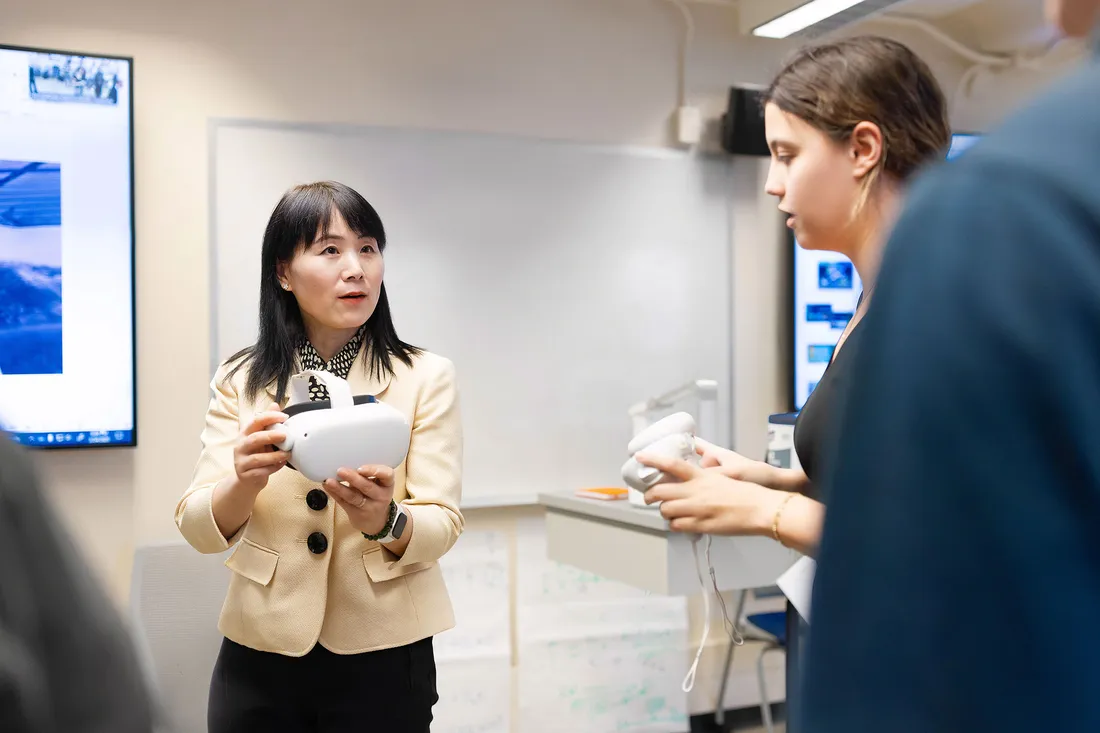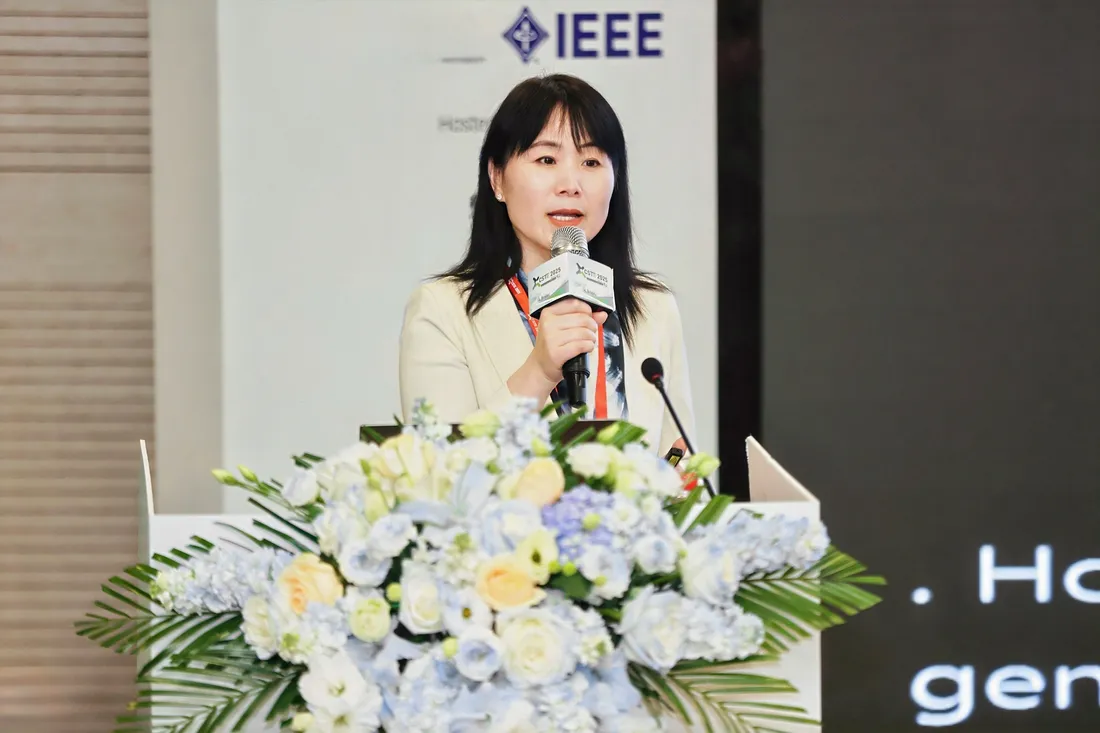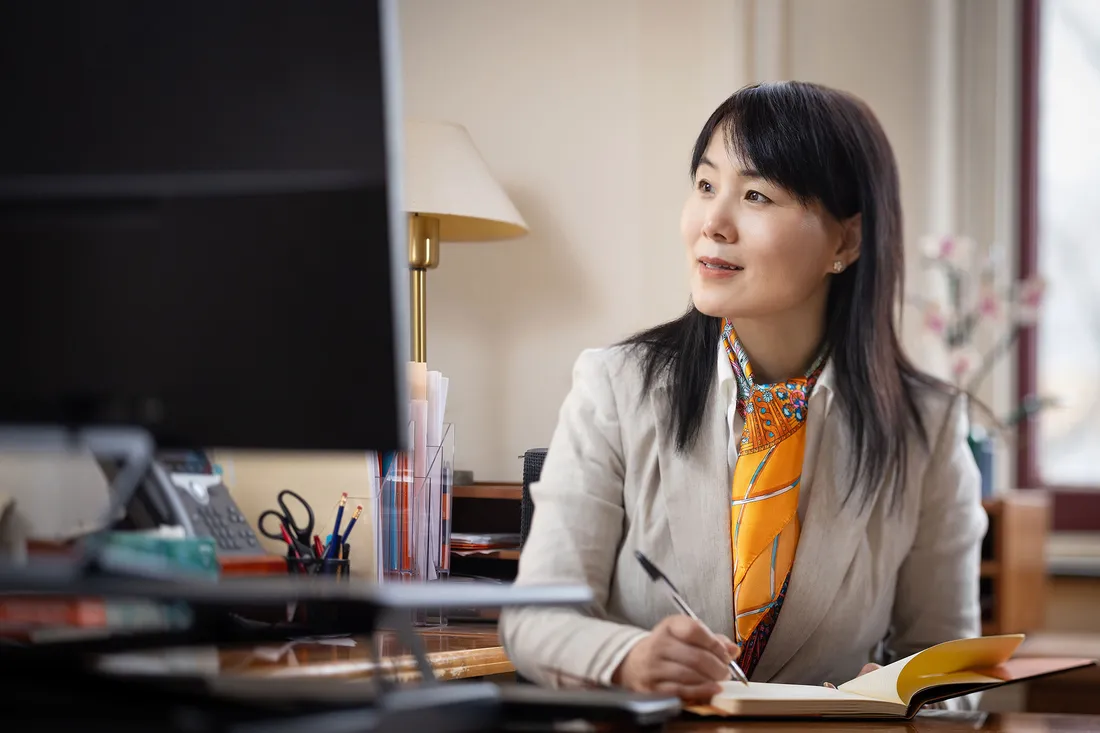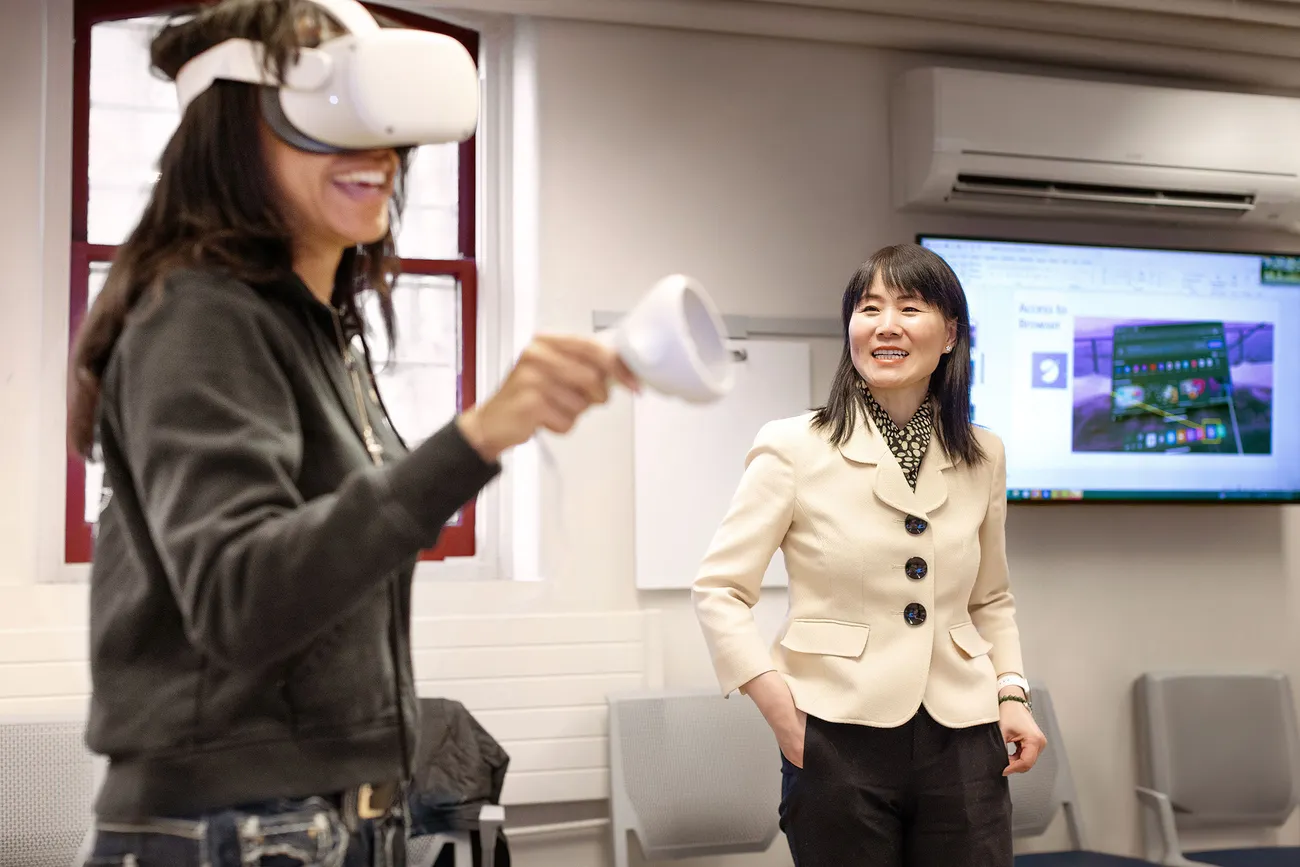Artificial intelligence (AI) is rapidly transforming the educational landscape, creating new opportunities and complex challenges for teachers, students and institutions. From supporting routine tasks, lesson planning and research to providing personalized tutoring and performing data analysis, AI’s growing role in the classroom is reshaping how we define learning, access and academic integrity.
“People all see clearly that AI is having an impact,” says Syracuse University professor Jing Lei, an expert on instructional design and information and communication technology, and associate dean for academic affairs at the School of Education. “But we are not very clear on what it means to us and, most importantly, how we should prepare to live and work in a world that is infused with AI.”
Lei embraces innovation for its potential to improve education and has studied the impact of emerging technologies on education for the past 25 years. She has seen the landscape of educational technology evolve from the introduction of computer labs in schools and equipping students with laptops to the rise of the internet, online learning and now AI. And unlike the decades it took to fully integrate computers into classrooms, AI seemingly burst into everyday life overnight.
“My driving interest is to see how these technological innovations affect education, teachers, students and learning—not only the academic outcomes but also the psychological and social impacts,” says Lei, co-author of three books, including Never Send a Human to Do a Machine’s Job: Correcting the Top 5 Edtech Mistakes (Corwin, 2016).
Gaining Global Insights on AI in Education
In her research, Lei reviews published studies to identify global trends in classroom technology and examines the different ways countries incorporate AI policies into their long-term educational plans. She cites countries such as South Korea and Japan for laying AI groundwork on large data processing technologies more than a decade ago, long before the emergence of ChatGPT and other generative AI platforms.
Since then, she says the number of studies on the convergence of AI and education has grown exponentially, including research on generative AI’s role in teaching subject areas like science and language learning. Some studies focus on AI literacy—becoming adept at appropriately using and understanding the technology—as well as which AI systems best match specific goals. “A lot of people are exploring at this stage,” Lei says. “There’s great interest to find out what are the useful, interesting and effective ways to integrate AI technology into their teaching and learning.”
Developing AI Literacy

School of Education professor Jing Lei is an expert on the use of emerging technologies in education. An advocate for AI literacy, Lei researches how countries incorporate AI policies into their educational plans.
Amid concerns about AI’s impact on the teaching profession, safety, privacy, bias and academic integrity, Lei encourages a human-centered approach and emphasizes the importance of teaching and developing AI literacy, which she considers digital citizenship for students. For example, in her graduate course Instructional Technology for Educational Settings, Lei requires students to use emerging technologies to address educational issues. “They evaluate available technologies, analyze the strengths and limitations of particular technology choices, understand the complexity of using the technology in resolving a particular educational situation and assess the impact of the technology’s applications,” she says.
As an advocate for using technology to create fair and consistent learning opportunities for all students, Lei also believes it’s important to address the digital divide—the gap between differences in access to technology and how the technology is employed.
Lei urges today’s teachers to pursue professional development in AI to better understand its use and leverage it to support their strengths. Employing AI to provide large-scale immediate feedback or automate routine tasks like drill and practice exercises will free up more time for direct student interaction. She recommends teachers reconsider course design, the purpose of assignments and ways to achieve the same learning objectives. “We need to look at how AI use poses challenges in terms of measurement assessment for education at different levels,” she says. “I see that as an opportunity for us to reform how we evaluate student performance and make education more purposeful and relevant to the students.”

A sought-after speaker on integrating AI into education, Lei addresses attendees at the International Conference on Computer Science and Technologies in Education last April in Wuhan, China.
Lei points out that educational resources like Blackboard have incorporated AI tools into their platforms. She uses several AI platforms and credits AI for simplifying such work as creating tables and charts, saving her valuable time. However, in using AI for research, she doubles down on fact-checking. “I once asked AI to summarize some literature on a topic, and it gave me a nicely written paragraph with a few nicely looking citations and references,” she says. “I checked these references, and they didn’t exist.”
Perhaps the most critical concern centers on academic integrity, or “AI in AI,” as Lei calls it. Accusing a student of using AI to craft an essay carries serious ramifications, and she questions the validity of AI detection tools, saying their assessments are not 100% accurate. “The best tool for teachers is to rely on their understanding of their student and look at their past work for a more accurate sense of whether a piece of work is produced by this student or by AI,” she says. “Teachers need to think about how to make the assignments meaningful and personal to the students.”
Leading the Conversation

In her Digital Pedagogies and Assistive Technology class, Lei has students use virtual reality headsets to interact with virtual school environments. She believes AI tools will soon be part of VR educational exercises.
In the classroom, Lei introduces students to AI tools for education and asks them to consider the ethical implications. Graduate-level teaching professionals perform AI-related research and reflect on their own AI experiences. In the course Educational Technology in International Settings, Chynara Turatbek Kyzy G’25, an instructional designer at the University of Central Asia in Kyrgyzstan, noted students are exploring generative AI tools like ChatGPT on their own and proposed several ideas to ensure the tools are used ethically and effectively. One proposal: “Embed AI ethics and critical AI literacy into digital skills courses across all undergraduate programs,” she wrote in a class discussion. “This will ensure that students approach AI use with informed skepticism, technical understanding and ethical responsibility.”
In Lei’s undergraduate course Digital Pedagogies and Assistive Technology, education students strap on virtual reality headsets and interact with virtual school environments, and she envisions AI tools being incorporated into such exercises in the future.
In the past year, Lei has shared her expertise on integrating AI in education in presentations at several international and regional conferences, including one for health care education. In one of her keynote addresses, she focused on developing AI leadership and how AI is changing the job market—and with it, the expectations placed on students. “Traditionally our education has been too focused on its utility—basically we prepare workers for the future,” she says. “I advocate that education needs to return to the original purpose of preparing well-rounded human beings, to help students develop a strong sense of self and purpose, and to help them develop their social emotional intelligence.”
Education in the age of AI, Lei emphasizes, needs to do much more than deliver content. “The issue is that we have unlimited access to so-called knowledge,” she says. “It will be the teacher’s job to help students navigate through this ocean of knowledge and to understand each student and their own individual needs, give them support and help them reach their goals.”


